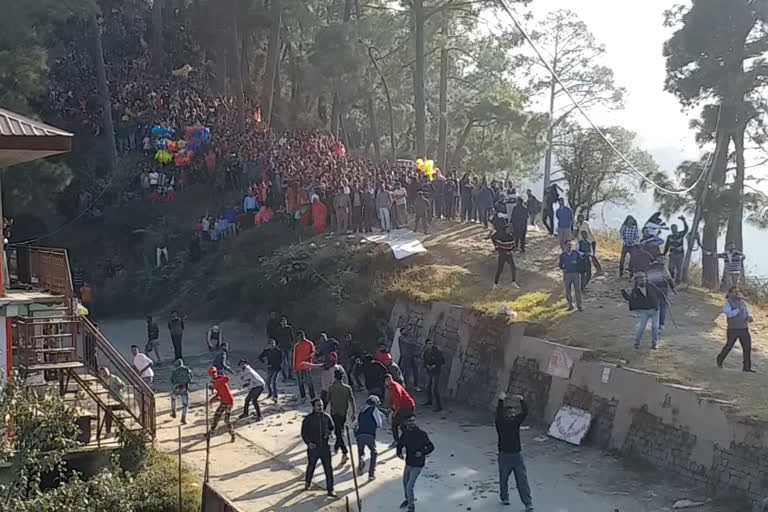Shimla (Himachal Pradesh): There are many practices and beliefs related to certain Gods and Goddesses since ages in Himachal Pradesh. People have been respecting these beliefs even today with the same intensity and devotion. Reflecting the same faith in rituals and customs, a stone fair was organised on the second day of Diwali in Shimla's Dhami.
Practising the age-long tradition at the fair, locals divide themselves into two groups and throw stones in the air for fifteen minutes till it hits someone. The rituals end after a 'tilak' is done at the raised platform of Sati and Bhadrakali temple with the blood of the person.
This year, Himanshu Kashyap got hurt during the stone-pelting at the fair and his blood was offered to Maa Bhima Kali.
"It is a matter of happiness for me that this year as I got the opportunity to offer tilak to Maa," Himanshu Kashyap said.
Locals believe that if blood does not ooze out the stone-injury it may lead to some critical epidemic.
Throwing light on the 400-year-old history of the fair, Jagdeep Singh of the royal family said that the traditional stone fair is being organised each year since the reins of royal families in Dhami area. Earlier Maa Bhima Kali was offered a human sacrifice, but after the death of the king of Dhami, the queen had decided to stop the human-sacrifice and started the tradition of stone pelting at each other before she immolated herself. The place where the queen immolated herself was turned in to a platform. Stones are pelted at each other from both sides of this platform. Stones are showered until a stone hits someone and the person starts bleeding.
Before kick-starting the fair, the royal families take out a procession leading to the Bhima Kali temple. During the stone pelting, visitors from both sides beat drums and raise slogans.
Police forces are also deployed on the spot to maintain peace, law and order. Traffic movement is also halted on 16 kilometre stretch of the road leading to Dhami-Halog, till the game continues.
It is believed that when the human sacrifices were stopped in the area, then animal sacrifices were held which could not satisfy Maa Bhima Kali and many people died due to the outbreak of an epidemic.



